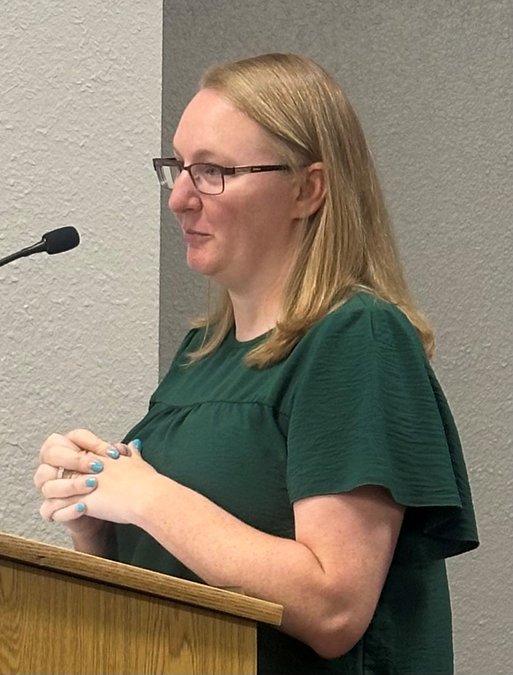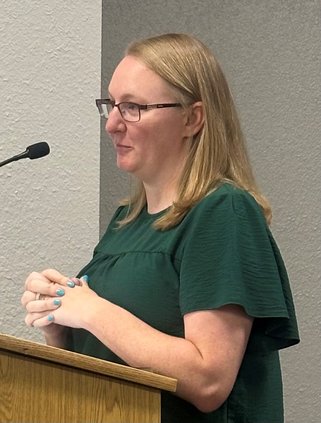Meeting at a glance
Here is a brief look at what the Barton County Commissioners did at their meeting Tuesday:
• Voted 5-0 to direct the Commission Chair to accept the grant award from the United States Department of Transportation (USDOT) for the Barton County Accessible Public Transportation Planning Project. The award of $239,180 will be used to assess and develop a master transportation plan covering all of Barton County. (Full story in the Saturday Great Bend Tribune.)
• Appointed Richard Ward to the Fire District No. 2 Board of Trustees. Ward will be representing South Homestead Township. This uncompensated appointment runs through December 31, 2026.
Other townships within the district include North Homestead, Albion, Eureka and Union as well as the cities of Hoisington, Olmitz and Susank. There will be no more than one appointment from each township and city.
• Announced the County Commission will meet as the Board of County Canvassers at 8:30 a.m. on Tuesday, Aug. 12 in the County Clerk Office.
The Board will be canvassing the Aug. 5 Primary Election — City of Great Bend, Ward 2.
By Keith Lippoldt
klippoldt@gbtribune.com
Senior Audit Manager Jami Benyshek of AdamsBrown presented the Barton County Commissioners the results of the 2024 Audit Report Tuesday at the Courthouse. The report covered the financial condition of Barton County from Jan. 1, 2024, through Dec. 31, 2024.
After the lengthy process of the audit was completed, the County passed with just one minor infraction due to an account improperly documented.
“I would say 95% of the information we get for the audit is submitted to us electronically, and so we’re able to work out the audit and get our questions gathered before we even come on site,” Benyshek said. “So then we end up on site for a day, sometimes a little bit more than a day, or finish up with a phone call after we’re here for that day. And so while we’re here on site, we also reach out to all the various fee offices, the sheriff’s department, all of those departments, and just want to recognize all of the employees’ work in answering all of our questions.
“I know we are overwhelming at times, but it’s made a huge difference in getting the audit done. I do want to thank Matt (County Administrator Patzner) and all of the finance team, all of the departments for helping us get the audit done.”
Benyshek pointed to several items in the audit to explain to the Commissioners. One of the items was unencumbered cash, which was sitting at $22,682,000 at the end of 2024. The year started with a cash total of $22,138,000 which she commented that “an increase in unencumbered cash is always a good thing.”
She also recognized some accounts with negative unencumbered cash which, typically, “We don’t want any fund to have a negative balance, but these are an exception. They are reimbursable brand funds, and so you have to spend the money and then you get reimbursed for it later. So it’s acceptable for those to have negative balances.”
Generally, these accounts get rectified or reimbursed within the first quarter of the following year.
In addition to the financial statement audit, Benyshek explained that since the County spent more than $750,000 in federal expenditures, it triggers a federal single audit.
“So with the single audit, we issue two more opinions. This is your auditor’s report on the internal control over financial reporting,” she said. “On the financial statement side, we make sure your procedures and controls are in place and documented well and appear to be working. So that’s what this letter says – another unmodified opinion and no financial statement findings in that letter.
“We have to collect all of the federal expenditures for the whole county, and then once we have that population, there is a test that we have to calculate which program to further test. This year, the way the numbers worked out, we actually had to test three programs. And so when I say each major program, that’s the three programs that we tested. And so for that we still have an unmodified opinion, but we do have one finding that we know. For the federal awards, there were no material weaknesses. We did have one significant deficiency and still an unmodified opinion.”
The three programs that were tested were the Coronavirus State and Local Discord Recovery, Distance Learning and Telemedicine, and the ELC (Epidemiology and Laboratory Capacity Program) Grant. Benyshek said these three programs were “heavily tested.”
There was a “significant deficiency” found in reference to the Distance Learning and Telemedicine account.
“This deficiency, it sounds worse than it is,” she said. “When we have a federal single audit, our two options are a material, weakness, or a significant efficiency. We have to call them that. It was just there as an internal control that wasn’t documented correctly and so we have to note it here.
“The county has a policy on when you have to go out for bid and when you don’t. And that policy, in this instance, was a little bit more lenient than what the federal grant required. And so you followed the county’s policy, it just wasn’t as strict as what the federal government required.
“And so the suggestion that is noted here is if you are going to not go out for competitive bids to get that in writing, that it is acceptable from whatever granting agency is allowing you to do so. Otherwise, it’s recommended to continue going out for the competitive bids.”
After the meeting had adjourned, Commission Chair Tricia Schlessiger was asked her opinion on the audit findings.
“I think it was a great audit,” she said. “We did have that one complication where we didn’t follow some federal policy, but we followed our own policy.”





